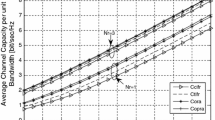Abstract
Space-time trellis codes have shown to provide a good performance in Rayleigh fading channels. Recently Super-orthogonal space-time trellis codes have shown to outperform these codes, and also provide a systematic design method to maximize diversity and coding gain in quasi-static Rayleigh fading channels. We investigate the performance of these new codes in rapid Rayleigh fading channels and further propose two concatenated versions of these codes. We further investigate the effect of imperfect channel state information on one of the concatenated versions. Some simulation results of the various concatenated schemes in quasi-static and rapid Rayleigh fading channels are presented.
Similar content being viewed by others
References
B. Vucetic and J. Yuan, “Space-Time Coding,” Wiley Publications, 2003.
V. Tarokh, N. Seshadri, and A.R. Calderbank, “Space-time Codes for High Data Wireless Communication: Performance Criterion and Code Construction,” IEEE Transactions on Information Theory, Vol. 44, No.2, pp. 744–765, Mar. 1998.
H. Jafarkhani and N. Seshadri, “Super-Orthogonal Space-Time Trellis Codes,” IEEE Transactions on Information Theory, Vol. 49, No. 4, pp. 937–950, Apr. 2003.
V. Tarokh, N. Seshadri and A.R. Calderbank, “Space-Time Block Codes from Orthogonal Designs”, IEEE Transactions on Information Theory, Vol. 45, No. 5, pp. 1456–1467, Jul. 1999.
G. Ungerboeck, “Channel Coding with multilevel(Phase Signals,” IEEE Transactions on Information Theory, Vol. 28, No. 1, pp. 55–67, Jan. 1982.
G.D. Forney, “Concatenated Codes,” Cambridge MA: MIT Press, 1966.
Yi Hong et al, “Space-time turbo Trellis Codes for Two, Three, and Four Transmit Antennas,” IEEE Transactions on Vehicular Technologies, Vol. 53, No. 2, pp. 318–328, March 2004.
V. Gulati and K.R. Narayanan, “Concatenated Codes for Fading Channels Based on Recursive Space-time Trellis Codes,” IEEE Transactions on Wireless Communications, Vol. 2, pp. 118–128, Jan. 2003.
G.J. Byers, Concatenated Space-time Codes in Rayleigh Fading Channels, Thesis, University of Natal, Mar. 2002.
J.N. Pillai and S.H. Mneney, “Concatenated super-orthogonal space-time trellis codes in Rayleigh fading channels”, IEEE EUROCON 2005, Conference on Computer as a Tool, Belgrade, Serbia and Montenegro, Nov. 21–24 2005.
G. Bauch, “Concatenation of Space-Time Block Codes and Turbo TCM”, in Proc. IEEE Int. Conf. Communications, Vol. 2, pp. 1202–1209, 1999.
A. Stefanov and T.M. Duman, “Turbo coded Modulation for Systems with Transmit and Receive Antenna Diversity Over Block Fading Channels: System Model, Decoding Approaches, and Practical Considerations,” IEEE Journal on Selected Areas in Communications, Vol. 19, No. 5. pp. 958–968, May 2001.
M. Jankiraman, Space-Time Codes and MIMO Systems, Artech House, Inc., 2004.
Author information
Authors and Affiliations
Corresponding author
Additional information
Jayesh N. Pillai received the B.Tech degree in Electrical and Electronic Engineering from the University of Calicut, Kerala, India in 2001. He is currently pursuing an MScEng degree in Electronic Engineering at the School of Electrical, Electronic and Computer Engineering at the University of KwaZulu-Natal, Durban, South Africa. His research interests are in the area of wireless communications, including multiple-antenna systems, space-time coding and channel coding.
Stanley Henry Mneney obtained his B.Sc.(Hons) Eng. Degree from the University of Science and Technology, Kumasi in Ghana in 1976. In 1979 he completed his M.A.Sc. from the University of Toronto in Canada. In a Nuffic funded project by the Netherlands government he embarked on a sandwich Ph.D. programme between the Eindhoven Univesity of Technology and the University of Dar es Salaam, the latter awarding the degree in 1988. His co-supervisors were Prof Jens Arnbak and Prof Ramje Prasad representing the two Universities. The research area was on the application satellite technology to provide low cost systems and services to the rural population in the developing countries.
Prof Mneney has taught at the Universities of Dar es Salaam, Nairobi, Durban Westville and he is currently an Associate Professor and Deputy Head of School of Electrical, Electronic and Computer Engineering at the University of KwaZulu-Natal in South Africa. His research interest includes Signal and Image processing, radio propagation and communication systems.
Rights and permissions
About this article
Cite this article
Pillai, J.N., Mneney, S.H. Turbo Decoding of Super-Orthogonal Space-Time Trellis Codes in Rayleigh Fading Channels. Wireless Pers Commun 37, 371–385 (2006). https://doi.org/10.1007/s11277-006-9029-6
Received:
Accepted:
Published:
Issue Date:
DOI: https://doi.org/10.1007/s11277-006-9029-6




